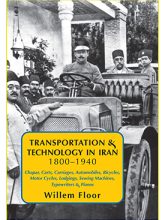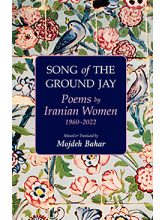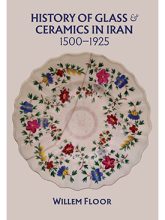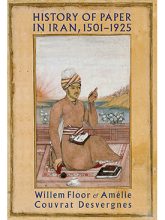Song of the Ground Jay: Poems by Iranian Women, 1960–2022
Song of the Ground Jay: Poems by Iranian Women, 1960–2022.[read more>>]
History of Paper in Iran, 1501–1925
About the Author Willem Floor studied development economics and non-western sociology, as well as Persian, Arabic and Islamology from 1963-67 at the University of Utrecht (the Netherlands). He received his doctoral degree from the University of Leiden in 1971. Since 1983, Dr. Floor was employed by the World Bank as an energy specialist, however, after his retirement in 2002, he has dedicated his time to the study of the social and political history of Iran, and has published extensively throughout this time. His books include: Public Health in Qajar Iran, Agriculture in Qajar Iran, and The History of Theater in Iran, as well as, The Persian Gulf: A Political and Economic History of 5 Port Cities, 1500-1730, its second volume, Persian Gulf: The Rise of the Gulf Arabs, 1747-1792, third volume, The Rise and Fall of Bandar-e Lengeh, the fourth volume, Bandar Abbas: The Natural Gateway of Southeast Iran, and the fifth volume, The Persian Gulf: Links with the Hinterland Bushehr, Borazjan, Kazerun, Banu Ka’b, & Bandar Abbas, The Persian Gulf: The Hula Arabs of The Shibkuh Coast of Iran, and The Persian Gulf: Dutch-Omani Relations A Commercial & Political History 1651-1806, and The Persian Gulf: Muscat – City, Society and Trade . He has also published, Travels Through Northern Persia, 1770-1774, Titles and Emoluments in Safavid Iran, and A Social History of Sexual Relations in Iran; Labor and Industry in Iran, 1850-1941; Guilds, Merchants and Ulama in 19th Century Iran; The Rise and Fall of Nader Shah; Games Persians Play, and History of Bread in Iran. His translations include: Samuel Gottlieb Gmelin’s Travels Through Northern Persia 1770–1774 , and with Hasan Javadi, Abbas Qoli Aqa Bakikhanov’s The Heavenly Rose-Garden: A History of Shirvan & Daghestan; Evliya Chelebi’s Travels in Iran and the Caucasus, 1647 and 1654; A Man of Two Worlds: Pedros Bedik in Iran, 1670–1675, Awake: A Moslem Woman’s Rare Memoir of Her Life and Partnership with the Editor of Molla Nasreddin, the Most Influential Satirical Journal of the Caucasus and Iran, 1907–1931, and Engelbert Kaempfer: Exotic Attractions in Persia, 1684–1688: Travels & Observations. Amélie Couvrat Desvergnes is an independent conservator working on paper artworks, books, maps, posters, 3D paper objects, modern art. She received her M.A. in Conservation from the University Panthéon-Sorbonne-Paris in 2002.[read more>>]
Never Invisible: An Iranian Woman’s Life Across the Twentieth Century
Reviews Privilege, along with innate gifts of intelligence and determination, shaped Houri Mostofi Moghadam in many ways, all vibrantly evident in Never Invisible. Drawn from her diaries, it documents the sweep of a long and eventful life as the world around her changed, sometimes for the better, sometimes bringing cruel setbacks. Houri was born into a lofty social stratum in Iran, a milieu of arranged marriages, overseas education for the young, financial comfort, and effective control of political power. Her father–described by her as “a learned man, hard-working, honest, and God-fearing”–was a prominent government official who served in a range of postings abroad and across Iran. Houri’s own exposure to another culture began when she entered a Franco-Persian kindergarten at the age of four. In later years, she would attend university (permitted for women only after reforms by Reza Shah in 1934), teach French and English in a top Iranian high school, spend time in America on a Fulbright grant, and run an important charitable organization with many international members. Always, however, the center of her life was her family–raising three children, running a large household, and supporting the career of her successful businessman husband. In mid-life, trouble arrived in many guises. Her marriage fell apart. She struggled with depression, moved abroad, bought an apartment in Paris, and, from a distance, watched in dismay as revolution broke out in Iran in 1978. In that upheaval, wrath and revenge was aimed chiefly at the upper class: One of her sisters and two uncles were imprisoned for a time. Houri did not return to Iran for 14 years. There, she found her house in ruins– “nothing left of the life we lived there.” Five more times she went back to seek some restitution, always in vain. But that was her way–a tireless fighter for what she saw as right, filling her life with activity and feeling, and brilliantly chronicling the flow of years in her diaries the whole while.[read more>>]
A Nook in the Temple of Fame: French Military Officers in Persian Service, 1807–1826
About the Author D.T. Potts is Professor of Ancient Near Eastern Archaeology and History at the Institute for the Study of the Ancient World, New York University. His lifelong fascination with and love of Iranian history and archaeology began with his first visit to Iran in 1973 and has led him to work on a wide range of topics extending in time from prehistory to the modern era. He is the author of The Archaeology of Elam: Formation and Transformation of an Ancient Iranian State (Cambridge, 1999, 2nd ed. 2016) and Nomadism in Iran: From Antiquity to the Modern Era (Oxford, 2014).[read more>>]











